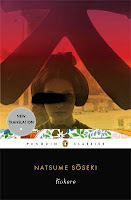 Author: Natsume Sōseki
Author: Natsume Sōseki
Translator: Meredith McKinney
U.S. publisher: Penguin
ISBN: 9780143106036
Released: February 2010
Original release: 1914
Natsume Sōseki’s last completed novel Kokoro has been sitting on my shelf waiting to be read ever since Penguin Classics published the most recent English translation by Meredith McKinney in 2010. So, I was very glad when Kokoro was selected for the September/October 2011 Japanese Literature Book Group. As far as I have been able to determine, there have been at least two other English translations of the novel: one in 1941 by Ineko Kondo and one in 1957 by Edwin McClellan. Kokoro was originally released in Japan in 1914 and is considered by many to be Sōseki’s masterpiece. Sōseki is well respected as a modern Japanese novelist and many of his works have been translated and published in English. Despite this, and despite having his earlier novel Sanshirō sitting on my shelf waiting to be read as well, Kokoro is the first of his books that I have read.
The meeting between a young student and the man he would come to call Sensei happened more by chance than anything else, but their developing relationship became extremely important to both of them. The student is still inexperienced in life and is genuinely earnest while Sensei is significantly more world-weary. He has a melancholic air about him, something that even his wife fails at being able to explain. The student is utterly fascinated by the enigmatic Sensei and wonders at the past he keeps hidden. Sensei himself is unexpectedly drawn to the student, perhaps hoping that he can help the younger man avoid some of the mistakes he made in his own life, or perhaps it’s just that he’s finally found someone that he can trust with the guilt that he has carried alone all these years.
Kokoro is told in three parts. The first two parts, “Sensei and I” and “My Parents and I,” are narrated by the unnamed student while the third part, “Sensei’s Testament,” takes the form of a lengthy letter written by Sensei, who also remains unnamed throughout the book, to the student. According to McKinney, “Sensei’s Testament” was initially written as a standalone work; it certainly can easily be read as such. However, although they read significantly differently because of the change in narrators, I greatly appreciated the inclusion of the first two parts of the novel. Seeing Sensei through the eyes of the student, who is more or less enraptured by him, allows the readers a chance to become even more invested in and curious about the man, mirroring the student’s own feelings. Even though Sensei tries to keep some distance between himself and the student, and even though the student actually knows very little about him, their relationship is a very intimate one without being sexual.
I enjoyed Kokoro immensely and am not at all surprised that it is called his masterpiece. I’ve not read any of his other works to be able to say so myself, but I am confident in saying that Kokoro is a remarkable piece of literature. I’ve also not read any of the other English translations of Kokoro to be able to compare, but I found McKinney’s translation to be unobtrusive and it reads very nicely. Even though Kokoro was written in Japan in 1914, the themes that it deals with—love, trust, betrayal, and guilt—are pertinent regardless of time and place. While it captures the spirit of the dying Meiji era, it is still a potent story today. Although the narrative can feel somewhat forced at times, the characterization of the two unnamed protagonists is exceedingly well done. They see a little bit of themselves in each other, and I saw a little bit of myself, too.
I’m glad to hear that you’ve enjoyed reading Kokoro. I do like Sōseki’s art of writing very much; beside the mentioned Kokoro I’ve read also I Am a Cat and a short story Bunchō – don’t know if it was translated into English, but I do recommend you both of stories.
Can’t wait to hear your thoughts about Sanshirō!
Thank you for stopping by and taking time to comment! I hope to have a review up for Sanshirō sometime in January. I’ll have to see if I can track down I Am a Cat and Bunchō, too. Thank you for the recommendations. ^_^